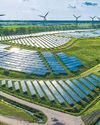
Abundant, reliable and cheap energy was the lifeblood that powered the Industrial Revolution and enabled the development of today’s rich nations. Most of us take it for granted, but in a world without plentiful energy, you wouldn’t be able to heat or cool your house, prepare your food, keep it fresh, get to work, use phones, computers or entertainment systems. Less obvious but even more importantly, most global systems meeting our basic needs would falter. Agriculture would falter because more than half the world is fed by synthetic fertilizers made from gas; industry creates millions of tools and wonders that sustain life, from pharmaceuticals to plastics; and as infrastructure is built with steel and cement, the globally integrated transportation network is entirely dependent on asphalt, trucks and container ships.
This is why there is such a close connection between more energy and higher incomes. No nation has ever gotten rich without a constant and immense flow of energy. Not surprisingly, the rest of the world wants that too.
Humanity has transitioned from dirty and inefficient fuels like wood to still dirty but less inefficient coal, and onward to oil and gas. These transitions took half a century each and were mostly driven by the reality that new fuels were more efficient and cheaper than older alternatives. Now that the world faces the challenge of climate change, many are pushing for an ultra-rapid transition over just a few decades from fossil fuels to clean energy, which is mostly seen as renewables.
هذه القصة مأخوذة من طبعة February 21, 2024 من Mint Mumbai.
ابدأ النسخة التجريبية المجانية من Magzter GOLD لمدة 7 أيام للوصول إلى آلاف القصص المتميزة المنسقة وأكثر من 9,000 مجلة وصحيفة.
بالفعل مشترك ? تسجيل الدخول
هذه القصة مأخوذة من طبعة February 21, 2024 من Mint Mumbai.
ابدأ النسخة التجريبية المجانية من Magzter GOLD لمدة 7 أيام للوصول إلى آلاف القصص المتميزة المنسقة وأكثر من 9,000 مجلة وصحيفة.
بالفعل مشترك? تسجيل الدخول

Buying Online? Beware Of these deceptive patterns
Deceptive prompts in apps—ways to coerce people into spending more time or money—are on the rise. Here's how to identify them

As AI gets real, slow and steady wins the race
Companies head into 2025 with careful deliberation when it comes to using AI

Why the Earth Is Not a Type 1 Technological Civilization
According to one theory about how we harness energy, Type 1s have total control over planetary energy resources
Our legislative frameworks must adapt to the rise of AI
Probabilistic digital systems complicate guilt assignment but we'll need tight controls against major harms

Take tax action for Viksit Bharat in the Union budget for 2025-26
The government could take major steps towards its worthy goal of a tax regime that's simple, predictable and competitive

Trump's US mustn't repeat its profiling of Chinese scientists
Espionage suspicions could lead the US to lose its war for talent
The rise of Trump poses a paradox of higher education
An elitist college system seems to have deepened divisions in the US and this may hold lessons for India too

There's a case for heavy taxes on MNC royalties
Royalty payments to MNCs by their local units have been rising-even going above dividend payouts in some cases. India needs shareholder vigilance and fiscal action to curb excesses
Financial frauds evolve fast but we can still safeguard ourselves
While technology has transformed how scamsters operate, reliable ways exist to dodge their traps

Smart-beta funds: A guide to balancing your portfolio
Tailor-made strategies will help you navigate the market cycles better and optimize returns